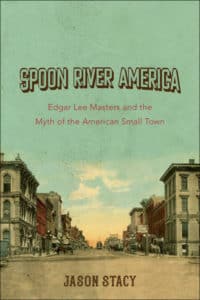Jason Stacy connects ‘Spoon River’ to American self-understanding
Reading a book of literary and cultural criticism about a favorite poetry collection led me to understand something about the community I live in.
Spoon River Anthology by Edgar Lee Masters (1868-1950) was published in 1915; it has the distinction of being one of the few poetry collections that have never been out of print. Its 212 characters tell the stories of their lives in the fictitious town of Spoon River in 244 poems. Many of the poems were first published by Reedy’s Mirror, a weekly literary journal published in St. Louis under editor William Marion Reedy.
What was unusual about the collection was how Masters developed and depicted the people of an American Midwest small town. Saints co-existed with sinners; sometimes, saints were sinners and vice versa. The poems read like tombstone epitaphs, as if summing up the life of each Spoon River resident.

Stacy examines Spoon River Anthology from several perspectives—the biographical perspective of the life of its author, the literary impact it made, its popular and critical reception, and, despite the huge changes in American life and culture since World War II, the collection’s lasting influence.
From the beginning, the collection was recognized as important. Stacy notes that, even before Masters had a contract to publish the collection as a book, word had reached New York and beyond about the poems in Reedy’s Mirror. A British critic went so far as to compare Masters favorably with Walt Whitman.
The collection’s influence has been remarkable. Disneyland’s Main Street USA. Sherwood Anderson’s Winesburg, Ohio. Ozzie and Harriet and Leave It to Beaver. Footloose and Breaking Away. Back to the Future (all three parts). A Prairie Home Companion. It’s a Wonderful Life. Main Street by Sinclair Lewis. Twin Peaks. Fargo. (And while Stacy doesn’t specifically mention it, you can add the Netflix series Virgin River to the list.) All of these, and many others, owe a debt to Spoon River Anthology and testify to its impact.

Jason Stacy
Stacy is a professor of history and social science pedagogy at Southern Illinois University (SIU) Edwardsville. He received his B.S. and M.A. from SIU Carbondale, a Master Degree of Liberal Arts from the University of Chicago, and a Ph.D. from Loyola University of Chicago. He’s published several books and numerous journal articles on American history and Walt Whitman. This exploration of Spoon River Anthology and its influence is a substantive contribution to the study of Masters, the poetry collection, and American history.
Even my own suburb of St. Louis understands itself (usually unknowingly) in the context of Spoon River Anthology. Founded in 1853, the oldest of the incorporated suburbs of St. Louis, Kirkwood has a still-functioning train station, 24 properties listed on the National Register of Historic Places, a main street (Argonne Drive) which at one time was actually called Main Street, memorials to war dead, a city hall, and our own police and fire departments. More significant is how residents see themselves and the community. As a friend once described it, Kirkwood is less a small town of 27,000 people than it is a civic religion.
And the religion is the mythical small Midwestern town described in the poems of Spoon River Anthology.
Related
Q&A with Jason Stacy – University of Illinois Press
How the Once Banned Spoon River Anthology Made a Comeback in Lewiston
Reading Spoon River Anthology for the Third Time
Photo by Serge Saint, Creative Commons, via Flickr. Post by Glynn Young.
How to Read a Poem uses images like the mouse, the hive, the switch (from the Billy Collins poem)—to guide readers into new ways of understanding poems. Anthology included.
“I require all our incoming poetry students—in the MFA I direct—to buy and read this book.”
—Jeanetta Calhoun Mish
- “Everybody in Amsterdam Speaks English.” Not. - December 4, 2025
- Poets and Poems: Hedy Habra and “Under Brushstrokes” - December 2, 2025
- Happy Thanksgiving, from Tweetspeak Poetry (and Henry Wadsworth Longfellow) - November 27, 2025


L.L. Barkat says
Poetry as influence. Amazing story. 🙂